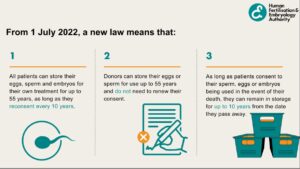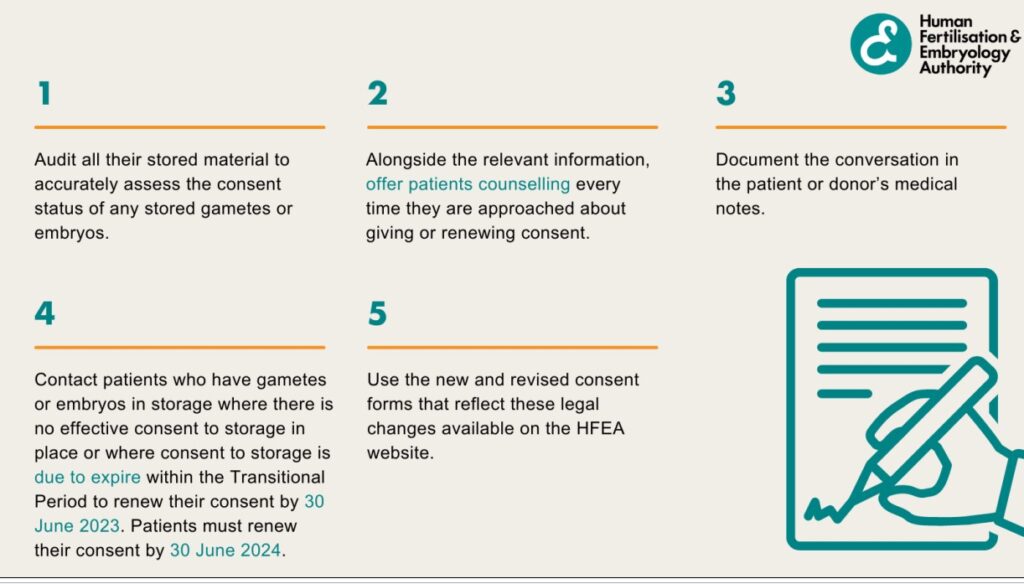
From 1 July 2022, the law changed to allow all patients to store their eggs, sperm and embryos for their own treatment for up to 55 years, providing they reconsent every 10 years. The HFEA is supportive of the changes but they do have significant implications for clinics as well as for some patients.
Patients must keep in contact with fertility clinics as new law comes into force
People should check that fertility clinics have their correct contact details following a change in the law that could see frozen eggs, sperm or embryos destroyed if consent isn’t renewed every 10 years.
From 1 July 2022, the law changed, allowing all patients to store their eggs, sperm and embryos for their own treatment for up to 55 years, providing they reconsent every 10 years. However, people who try to preserve their fertility – cancer patients or patients undergoing hormone therapy for example – now must reconsent; something they did not need to do previously.
There have also been some changes in relation to donation that mean donors can store their eggs or sperm for use for up to 55 years, and do not need to renew their consent.
Rachel Cutting, the HFEA’s Director of Compliance and Information, said:
“The change in law means that all patients have equal opportunity to store eggs, sperm or embryos for up to 55 years, providing consent is given every 10 years. It also means that patients requiring donor sperm and eggs have up to 55 years to access the material, providing consent is in place. Patients who have previously donated and consented to storage for 10 years may wish to consider consenting for longer so other patients can benefit from their donation. They should contact their clinic to discuss this further. “For patients who have tried to preserve their fertility before chemotherapy, radiotherapy or hormone therapy, it’s important they keep their contact details up to date so that clinics can reconsent every 10
years. If a clinic cannot contact a patient then their eggs, sperm or embryos may be disposed of. This is even if they consented for more than 10 years storage previously. We’ll be working with clinics and key patient facing organisations to ensure these patient groups are aware this important change.”
The updated law reflects the advances in science, changes in modern society and individuals’ reproductive choices, giving patients more time to make important decisions about their future. From 1 July 2022:
- All patients can store their eggs, sperm and embryos for their own treatment for up to 55 years, providing they reconsent every 10 years
- Donors can store their eggs or sperm for use up to 55 years and do not need to renew their consent
- Providing patients consent to their sperm, eggs or embryos being used in the event of their death, they can remain in storage for up to 10 years from the date they pass away.
If consent expires within the next two years, clinics have until 30 June 2023 to contact patients who had eggs, sperm or embryos in storage before the law changed on 1 July 2022. The HFEA recommend patients check their clinic has their current contact details to ensure they can do this.
Under UK fertility law – the Human Fertilisation and Embryology Act 1990 – anyone who wants to store their sperm, eggs (also known as gametes) or embryos can do so if they provide written consent. The consent process is important because it ensures a patient’s sperm, eggs or embryos are stored, and used in ways in which they are comfortable with, including if they pass away.
The Department of Health and Social Care (DHSC) set the timetable for the change to be implemented. Parliament passed the legislation in April 2022, which required the HFEA to update and produce new consent forms by July 1 when the changes took effect, as well as guidance to support fertility clinics understand the changes.
General key messages
- Under UK fertility law – Human Fertilisation and Embryology Act 1990 – anyone who wants to store their sperm, eggs (also known as gametes) or embryos can do so if they provide written consent.
- Around 60,000 patients a year access fertility services in the UK, with almost half of patients freezing eggs or embryos; the majority of whom are doing so as part of routine fertility treatment.
- People might choose to store sperm, eggs or embryos ahead of treatment that could cause infertility – chemotherapy, radiotherapy and hormone therapy for example – whilst others choose to try to preserve their fertility if they want a family but aren’t ready to have children yet.
- From 1 July 2022, a new law came into force which means that:
- All patients can store their eggs, sperm and embryos for their own treatment for up to 55 years, providing they reconsent every 10 years
- Donors can store their eggs or sperm for use up to 55 years and do not need to renew their consent
- Providing patients consent to their sperm, eggs or embryos being used in the event of their death, they can remain in storage for up to 10 years from the date they pass away.
- The new law reflects the advances in science, changes in modern society and individuals’ reproductive choices, giving patients more time to make important decisions about planning their family.
- Patients need to consider many things before they begin fertility treatment and some are incredibly difficult; would I want my partner to use my eggs, sperm or our embryos if I pass away? Although tough, it’s very important couples have these conversations, and then with their clinic, so their wishes can be respected.
- The Department of Health and Social Care (DHSC) set the timetable for the change to be implemented. Parliament passed the law in April 2022 and required the HFEA to update and produce new consent forms by July 1 when the changes took effect, as well as guidance to support fertility clinics understand the changes.
Patient facing messaging for those considered prematurely infertile
- If you choose to try to preserve your fertility, you can store your eggs, sperm or embryos for up to 55 years, but you will be asked to renew your consent to storage every 10 years.
- The consent process is important because it ensures your sperm, eggs or embryos are stored, and used in ways that you are comfortable with. Clinics have a legal duty to ensure your wishes are respected.
- Stay in touch with your clinic. Life moves quickly but it’s extremely important that your clinic has up-to-date contact details for you so you can renew consent every 10 years. If a clinic cannot contact you then your eggs, sperm and embryos may be disposed of. This is even if you consented for more than 10 years storage.
- If you had eggs, sperm or embryos in storage before 1 July and your consent to storage is due to expire before June 2024 (ie have been in storage for 10 years), your clinic has until 30 June 2023 to contact you about reconsenting to store for another 10 years. Your clinic can only do this if they have the correct contact details for you. It is worth checking this with them if you are unsure.
- Choosing to freeze your eggs is a serious undertaking and, like many medical procedures, involves some risk, as well as the costs involved. Freezing your eggs is not a guarantee of having a baby in the future but the younger you freeze your eggs, the more chances there are of success.
- Patients need to consider many things before they try to preserve their fertility and some are incredibly difficult, particularly if they’re receiving treatment for other conditions. However, it’s very important patients speak to their clinic about what they’d like to do with their eggs, sperm or embryos if they were to pass away. This is to ensure their wishes can be respected.
Key messaging for donors
- The new law on storage is clear for donors. The eggs and sperm can be stored for use forup to 55 yearsand donors do not need to renew their consent.
- Donation is an altruistic act and can help others have children that wouldn’t otherwise be possible. But you should be aware of the implications that your eggs or sperm could be stored for up to 55 years and you must receive proper implications counselling and advice to think about this.
- The new law now allows donor sperm and eggs to be stored for up to 55 years. If you have previously donated and consented to storage for 10 years you may wish to consider consenting for longer. Please do contact your clinic to discuss further.
To find out more about the storage changes visit www.hfea.gov.uk




